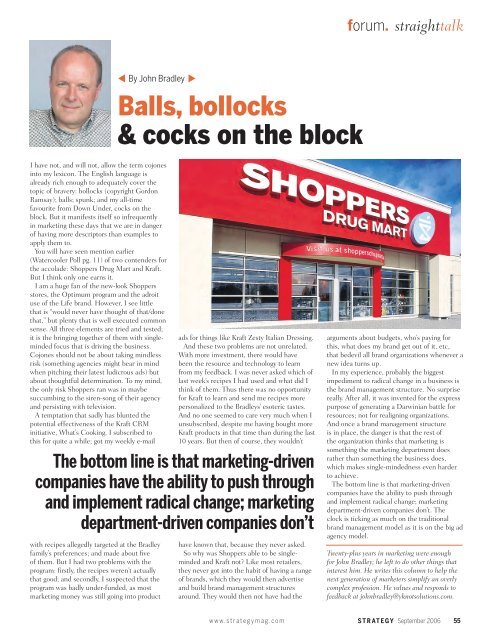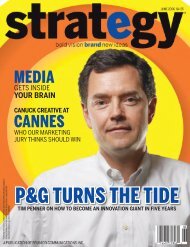THENEWRATPACK - Strategy
THENEWRATPACK - Strategy
THENEWRATPACK - Strategy
You also want an ePaper? Increase the reach of your titles
YUMPU automatically turns print PDFs into web optimized ePapers that Google loves.
I have not, and will not, allow the term cojones<br />
into my lexicon. The English language is<br />
already rich enough to adequately cover the<br />
topic of bravery: bollocks (copyright Gordon<br />
Ramsay); balls; spunk; and my all-time<br />
favourite from Down Under, cocks on the<br />
block. But it manifests itself so infrequently<br />
in marketing these days that we are in danger<br />
of having more descriptors than examples to<br />
apply them to.<br />
You will have seen mention earlier<br />
(Watercooler Poll pg. 11) of two contenders for<br />
the accolade: Shoppers Drug Mart and Kraft.<br />
But I think only one earns it.<br />
I am a huge fan of the new-look Shoppers<br />
stores, the Optimum program and the adroit<br />
use of the Life brand. However, I see little<br />
that is “would never have thought of that/done<br />
that,” but plenty that is well executed common<br />
sense. All three elements are tried and tested;<br />
it is the bringing together of them with singleminded<br />
focus that is driving the business.<br />
Cojones should not be about taking mindless<br />
risk (something agencies might bear in mind<br />
when pitching their latest ludicrous ads) but<br />
about thoughtful determination. To my mind,<br />
the only risk Shoppers ran was in maybe<br />
succumbing to the siren-song of their agency<br />
and persisting with television.<br />
A temptation that sadly has blunted the<br />
potential effectiveness of the Kraft CRM<br />
initiative, What’s Cooking. I subscribed to<br />
this for quite a while; got my weekly e-mail<br />
with recipes allegedly targeted at the Bradley<br />
family’s preferences; and made about fi ve<br />
of them. But I had two problems with the<br />
program: fi rstly, the recipes weren’t actually<br />
that good; and secondly, I suspected that the<br />
program was badly under-funded, as most<br />
marketing money was still going into product<br />
By John Bradley<br />
Balls, bollocks<br />
& cocks on the block<br />
ads for things like Kraft Zesty Italian Dressing.<br />
And these two problems are not unrelated.<br />
With more investment, there would have<br />
been the resource and technology to learn<br />
from my feedback. I was never asked which of<br />
last week’s recipes I had used and what did I<br />
think of them. Thus there was no opportunity<br />
for Kraft to learn and send me recipes more<br />
personalized to the Bradleys’ esoteric tastes.<br />
And no one seemed to care very much when I<br />
unsubscribed, despite me having bought more<br />
Kraft products in that time than during the last<br />
10 years. But then of course, they wouldn’t<br />
The bottom line is that marketing-driven<br />
companies have the ability to push through<br />
and implement radical change; marketing<br />
department-driven companies don’t<br />
have known that, because they never asked.<br />
So why was Shoppers able to be singleminded<br />
and Kraft not? Like most retailers,<br />
they never got into the habit of having a range<br />
of brands, which they would then advertise<br />
and build brand management structures<br />
around. They would then not have had the<br />
forum. straighttalk<br />
arguments about budgets, who’s paying for<br />
this, what does my brand get out of it, etc,<br />
that bedevil all brand organizations whenever a<br />
new idea turns up.<br />
In my experience, probably the biggest<br />
impediment to radical change in a business is<br />
the brand management structure. No surprise<br />
really. After all, it was invented for the express<br />
purpose of generating a Darwinian battle for<br />
resources; not for realigning organizations.<br />
And once a brand management structure<br />
is in place, the danger is that the rest of<br />
the organization thinks that marketing is<br />
something the marketing department does<br />
rather than something the business does,<br />
which makes single-mindedness even harder<br />
to achieve.<br />
The bottom line is that marketing-driven<br />
companies have the ability to push through<br />
and implement radical change; marketing<br />
department-driven companies don’t. The<br />
clock is ticking as much on the traditional<br />
brand management model as it is on the big ad<br />
agency model.<br />
Twenty-plus years in marketing were enough<br />
for John Bradley; he left to do other things that<br />
interest him. He writes this column to help the<br />
next generation of marketers simplify an overly<br />
complex profession. He values and responds to<br />
feedback at johnbradley@yknotsolutions.com.<br />
www.strategymag.com STRATEGY September 2006 55














